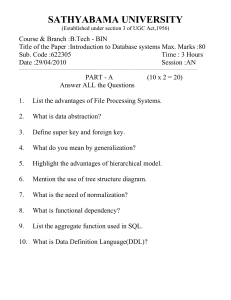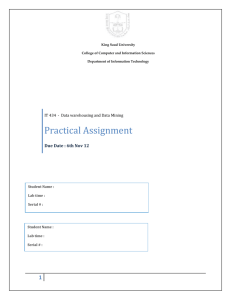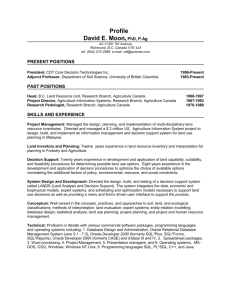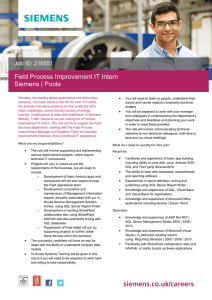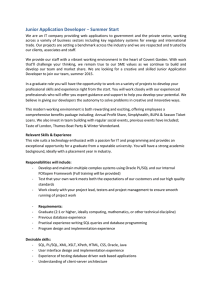Chabot College Fall 2002 Removed Fall 2006
advertisement
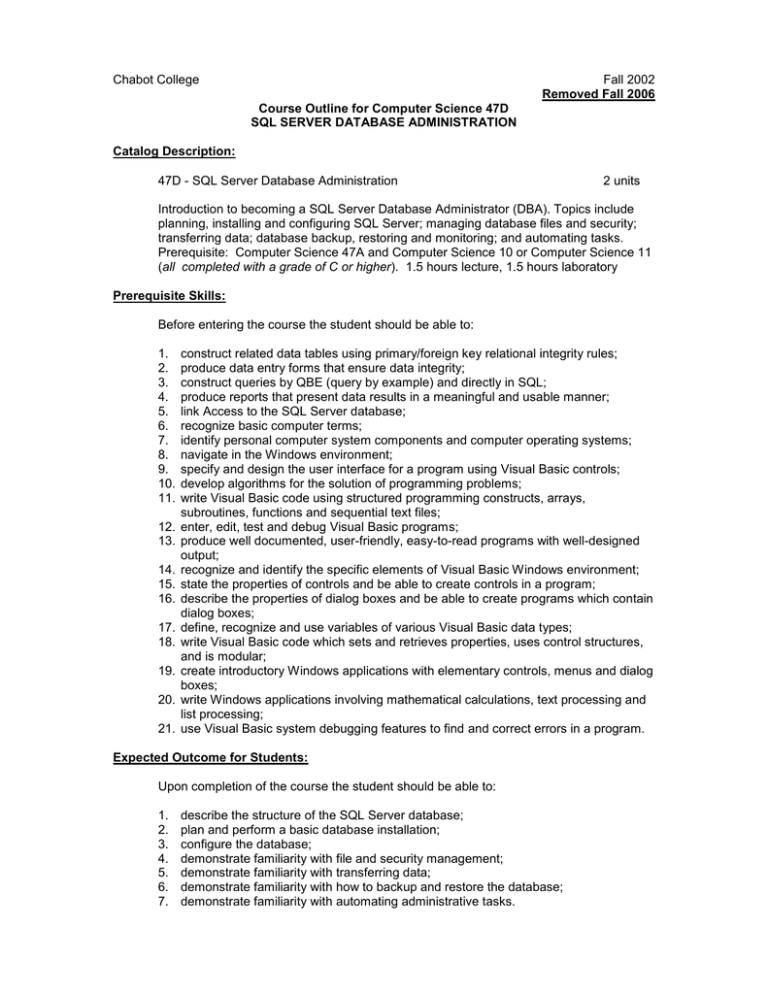
Chabot College Fall 2002 Removed Fall 2006 Course Outline for Computer Science 47D SQL SERVER DATABASE ADMINISTRATION Catalog Description: 47D - SQL Server Database Administration 2 units Introduction to becoming a SQL Server Database Administrator (DBA). Topics include planning, installing and configuring SQL Server; managing database files and security; transferring data; database backup, restoring and monitoring; and automating tasks. Prerequisite: Computer Science 47A and Computer Science 10 or Computer Science 11 (all completed with a grade of C or higher). 1.5 hours lecture, 1.5 hours laboratory Prerequisite Skills: Before entering the course the student should be able to: 1. 2. 3. 4. 5. 6. 7. 8. 9. 10. 11. 12. 13. 14. 15. 16. 17. 18. 19. 20. 21. construct related data tables using primary/foreign key relational integrity rules; produce data entry forms that ensure data integrity; construct queries by QBE (query by example) and directly in SQL; produce reports that present data results in a meaningful and usable manner; link Access to the SQL Server database; recognize basic computer terms; identify personal computer system components and computer operating systems; navigate in the Windows environment; specify and design the user interface for a program using Visual Basic controls; develop algorithms for the solution of programming problems; write Visual Basic code using structured programming constructs, arrays, subroutines, functions and sequential text files; enter, edit, test and debug Visual Basic programs; produce well documented, user-friendly, easy-to-read programs with well-designed output; recognize and identify the specific elements of Visual Basic Windows environment; state the properties of controls and be able to create controls in a program; describe the properties of dialog boxes and be able to create programs which contain dialog boxes; define, recognize and use variables of various Visual Basic data types; write Visual Basic code which sets and retrieves properties, uses control structures, and is modular; create introductory Windows applications with elementary controls, menus and dialog boxes; write Windows applications involving mathematical calculations, text processing and list processing; use Visual Basic system debugging features to find and correct errors in a program. Expected Outcome for Students: Upon completion of the course the student should be able to: 1. 2. 3. 4. 5. 6. 7. describe the structure of the SQL Server database; plan and perform a basic database installation; configure the database; demonstrate familiarity with file and security management; demonstrate familiarity with transferring data; demonstrate familiarity with how to backup and restore the database; demonstrate familiarity with automating administrative tasks. Chabot College Course Outline for Computer Science 47D Fall 2002 Page 2 Course Content: 1. SQL Server database structure a. Planning for installation b. Installing and configuring 2. Database management a. Files b. Security c. Transferring data d. Backup and restoration e. Monitoring performance 3. Automating administrative tasks 4. Data replication Methods of Presentation: 1. Lecture, discussion and classroom demonstrations. 2. Student use of appropriate computer laboratory. Assignments and Methods of Evaluating Student Progress: 1. Typical Assignments a. Diagram the architecture of the SQL Server database. Distinguish between physical and logical units. Describe how user accounts are created and how roles and privileges are assigned. b. Load SQL Server in a two-computer client/server configuration. Load the Query Analyzer on the client PC and make the network connections necessary for it to talk to the server. Setup and configure the remote administration interface on the client PC. c. Perform a backup of all the system and user tables on a running SQL Server database. Delete all the user database tables and then restore them from your backup. Configure an automated backup sequence for the database. 2. Methods of Evaluating Student Progress a. Exams which may include quizzes, midterms and a required final examination. b. Writing and implementation of various and multiple assigned programs and other assignments that utilize all topics included above in the course of study. Textbooks(s) (typical): SQL Server 7 Administration Study Guide; Syngress media staff, Syngress Press, 1999 Special Student Materials: Computer lab fee Diskettes Optional zip disk A. Oliver E:/CS/CS46C.Jan00 Renamed: Carol Conway Fall 2002 CS 47D Outline Fall 2002
